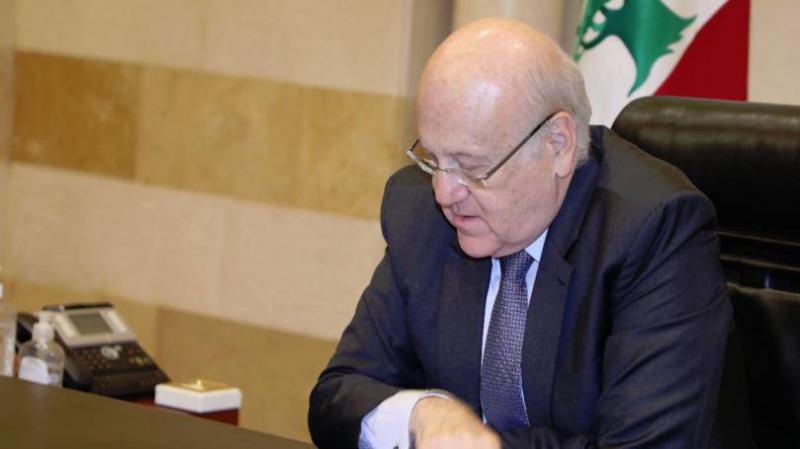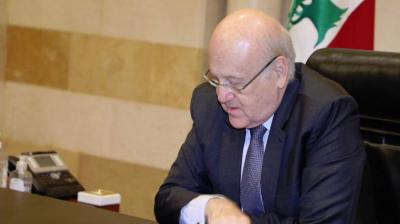The caretaker Prime Minister Najib Mikati confirmed that "the army is conducting the necessary investigations regarding the incident that occurred with UNIFIL in the south, which resulted in the death of a member of the Irish contingent and injuries to three others, and we hope to reach conclusions soon." During his meeting with the Journalists' Syndicate at the Grand Serail, he pointed out that "bidding on this file is unacceptable, as is belittling the seriousness of what happened or considering it an ordinary or incidental incident. This incident must be taken seriously, and full investigations and accountability must be conducted. I am following up on this issue with the army leadership, which is carrying out the necessary investigations, and we hope to reach a result soon."
In response to a question, he stated, "Since the incident occurred outside the UNIFIL operations area, it is likely that it was not planned." Regarding the file of the border town of Rmeish, he said, "I have requested a complete report from the army on the matter, noting that cooperation is ongoing between the army and UNIFIL on this file, and they are monitoring the sites related to the 'Green Without Borders' organization."
Addressing the government file, he noted that "the government is committed to its constitutional duties during the vacancy in the presidency until a new president is elected, with the primary priority being the election of a new president and then the formation of a new government." He added, "The election of a new president does not mean the end of the crisis, but rather opens the door to a grace period in the country to reach a solution." In response to a question, he said, "Yes, based on external data, something is being prepared to resolve the crisis, but things take time."
On holding new Cabinet sessions after the previous session was met with objections, he considered that "when necessary, I will call the Cabinet to convene according to the constitutional powers entrusted to me, but at the moment, there is nothing urgent that requires a session." He emphasized that "the agenda of the Cabinet is exclusively the responsibility of the Prime Minister, and no one else shares in this matter. If a Cabinet session is held, the agenda will be discussed, and an understanding will be reached on what is approved and what is not."
He announced his rejection of the concept of "rolling decrees" proposed by some, emphasizing that there is no constitutional basis for it and reiterating that "only what is stated in the constitution and its spirit will be implemented." He stressed, "Decisions of the Cabinet are made by the majority of those present in ordinary matters, and by the majority of the number of government members in exceptional decisions." In response to a question, he said, "Enough of the obstruction and the public declaration of it; it is more beneficial to find incentives to move the country forward rather than paralyze what remains of institutions."
He added, "The decisions made in the last Cabinet session have been issued as decrees, and there is no compromise on this matter. All decrees require holding a Cabinet session for approval." He went on, "Some say that the current government's powers are limited and narrow, at a time when an effective government is needed to fulfill its complete duties. What we are currently doing in the government is maintaining the situation, managing people's affairs, and preserving the structure of the state until a new president is elected. There are many difficulties, but the solution is easy and lies in the Lebanese agreeing on their vision for the country's future, away from populism that offers no benefit. We are in a state of emergency, and we must agree, both the government and the parliament, on the foundations of the solution."
Regarding the issue of Beirut Airport and allegations of Iranian weapons being smuggled, he said, "Last week, I met with the army commander and security leaders, and they all confirmed that the investigations conducted indicated that these claims are untrue, and no weapons are entering through the airport." He stated that, when discussing the airport issue, and after the UNIFIL incident, he was about to convene the Supreme Defense Council in his capacity as Deputy Chairman, but he decided against it to avoid any perception of provocation.
On the meeting with Saudi Crown Prince Mohammed bin Salman, he said, "The meeting was excellent, and we discussed matters concerning the country, and he expressed his affection for Lebanon and specifically for the Lebanese residing in the Kingdom of Saudi Arabia." The meeting between President Mikati and the Journalists' Syndicate began with a speech by Syndicate Head Joseph Kseifi, in which he stated: "The hopes of the Lebanese today are buried, their dreams shattered, and they are asking: Will this long night end with a dawn, or will it extend without feeling the light at the end of the tunnel? You were recently in Saudi Arabia and met with its Crown Prince, Prime Minister Mohammed bin Salman. Are there any indicators pointing to a shift in Riyadh's position that could serve as a leverage for the solutions being sought in international and regional decision-making capitals concerning Lebanon? Is reliance solely on remittances from expatriate Lebanese to alleviate the hunger of their families, in the absence of social and health care, becoming the norm? Is it befitting for the Lebanese to remain on the sidelines of anxiety while waiting for charitable organizations and relief bodies to provide them with basic needs and medications, some of which serve hidden agendas? The Lebanese have suffered from the humiliation imposed on them for too long, but we fear a revolution that could erupt. If a hunger revolt occurs – and we do not rule out its imminent possibility – it could sweep away everything in its path. Beware of reaching this stage to spare us from wider destruction and greater ruin. Be honest with the Lebanese. To avert what is even worse. Honesty is better than hiding the affliction. Because deriving the truth from those at the pinnacle of responsibility and authority remains the most appropriate course."




